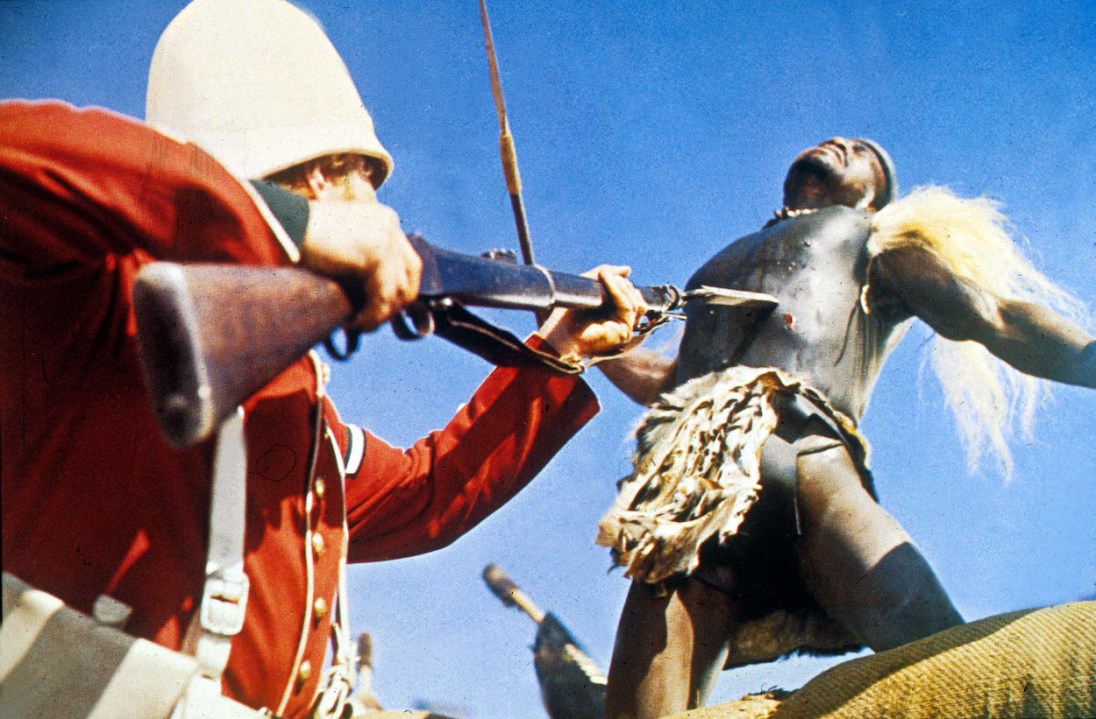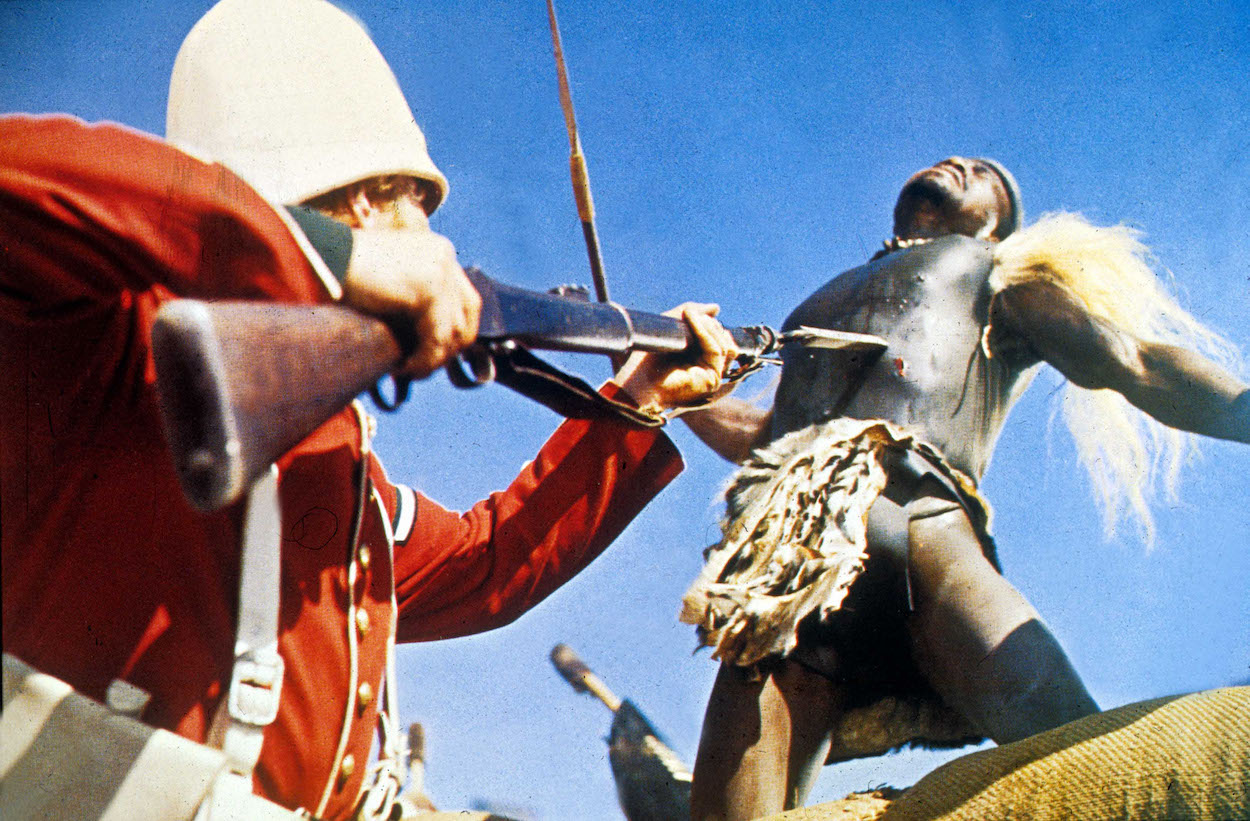It is a great mystery how Zulu, a tale of imperial derring-do from the Anglo-Zulu war of 1879, has avoided being cancelled. On the face of it, this is a film that revels in one of the most heinous, most blood-thirsty chapters of our colonial past, one tinged with technologically enabled white supremacy. Here is a war film about 140 white Europeans who take on a Zulu force of 4,000 and defeat them, thanks largely to the rapid and orchestrated fire of short-chamber Martini-Henry rifles. (‘And a bayonet,’ as Nigel Green, as colour sergeant Bourne, puts it, ‘with some guts behind it.’)
In the age of Zulu, colonialism wasn’t just a discredited idea, it was finished
So it was especially gratifying to see it once again on Channel Four over the Christmas break, albeit with a trigger warning of ‘nudity, battlefield violence and language and attitudes of the era that may offend’ – all rather like flagging up ‘iceberg-related trauma’ ahead of a showing of Titanic.
And yet watch Zulu and you discover that it is anything but a celebration of colonialism or blood-soaked jingoism – or indeed of racial supremacy of any particular kind. In fact, a smash hit on its release in 1964, 60 years ago this month, the film continues to be highly regarded – the BFI ranked it 31st in its 1999 list of the greatest British films of the 20th century, while Empire magazine has it in 33rd place in its 2023 list of the greatest 100 British films of all time (sandwiched between A Man For All Seasons and 1995’s Sense and Sensibility).
In part the secret of Zulu’s enduring appeal lies in the personalities at its heart: first, for a film supposedly about a British imperial success, it was directed and co-produced by Cy Endfield, an American filmmaker who was only in Britain in the 1960s because he had been black-listed in Hollywood for his youthful involvement in communist activism. In him, then, there was no friend of British imperialism. Which explains the next part of the formula: the casting of working class-lad, Michael Caine, in his first major role, playing against type as an upper-class officer. Caine has said that no English director would have cast him in the role; it took a classless American and communist sympathiser to get his career off the ground. We also have the film’s then star and co-producer, Stanley Baker, a Labour-party supporter born into a coal-mining family in South Wales. Between them the still-fresh screenplay by John Prebble – a Brit who also happened to be a communist andhad a Native American great aunt no less – there is a decidedly sardonic gloss to this tale of British imperial military steadfastness. As well as veering between evocative scene setting and ever mounting jeopardy (along with Shakespearian-lite comic turns from the rank and file), the script crucially laces the eventual ‘victory’ of the British with a convincing bitterness. It also makes a string of jabs at Britain’s social hierarchy, rather more prevalent and potent in the 1960s then than now. (Indeed, don’t forget that Alec Douglas-Home, the 14th Earl of Home, was in No. 10 when the film came out.)
Some critics have claimed that the film is disingenuous, that it serves up pacificist pieties in order to paper over its glorification of the military action. It’s hard not to have some sympathy for the position, but I would argue that a balance is achieved. Moreover the film is not blood-thirsty by modern standards. While the body-count is high, if you compare the depictions of violence in it to a film like The Revenant, say, then Zulu looks about as tame as an episode of Hey Duggee.
Among those who clearly agreed that the filmmakers got it right was one of its other stars, the South African politician, tireless anti-Apartheid campaigner and Zulu prince Chief Buthelezi, who died last year aged 95, having served for a decade in the governments of South African presidents Nelson Mandela and Thabo Mbeki. As well as portraying his great-grandfather, King Cetshwayo (whom he apparently resembled), Buthelezi remained a fan of the film – which doubtlessly bolstered a sense of Zulu patriotism – and attended a 50th anniversary screening of the film alongside Prince Harry and Stanley Baker’s widow in London in 2014. In 2018, amid criticism of the film, Buthelezi defended it, telling the Times: ‘Even if the past is uncomfortable, and perhaps especially when the past is uncomfortable, it needs to be examined and unpacked rather than hidden away. Of course race is a central theme in the film.’
Which is the point, isn’t it? Because for all that Zulu makes for an exciting David-against-Goliath-war film, it also wears its heart and politics on its sleeve. Here is a film that is a product of its time – the early 1960s, when colonialism was about as in vogue as it is now. Between Macmillan’s winds of change speech in February 1960 and the release of the film in January 1964, no fewer than six African colonies gained independence from Britain, including Nigeria, Kenya and Uganda. By 1968, another seven had gone. In the age of Zulu, colonialism wasn’t just a discredited idea, it was finished.
The film is far from perfect, of course. While the arc of the story is accurate, it takes liberties with the truth. In reality, for instance, Henry Hook, the disorderly private played by James Booth in the film, was a teetotaller and model soldier whose daughters walked out of the premier of the film in disgust at his portrayal. Naturally, there will be those who believe that it doesn’t go far enough to distance itself from the horrors its depicting.
What we can say for certain is that Zulu endures in part because it’s undoubtedly a thrilling tale, but primarily because it’s a war film is about survival not victory. It’s a film that celebrates human courage, not imperialism. And while it contains racists – characters who betray the social mores of the Victorian era – it is itself unracist, since, as anyone who’s seen it knows, the British only get through the ordeal by adopting the preferred military tactics of the Zulus themselves and therefore learning from them. That we are not spared the appalling human consequences of mechanical firepower as Cy Endfield’s camera slowly pans across the slain Zulu bodies very deliberately tells you all you need to know. Whatever their pre-existing prejudices those that live depart with an elevated respect for their foes. (As one of the Welshmen puts it: ‘I think they’ve got more guts than we have, boyo’.)
So don’t shy away from Zulu and, if you haven’t watched it in a while take another glance. The Drakensberg Mountains are stunning, the skies razor sharp; there’s Nigel Green’s wonderfully understated colour sergeant Bourne and then there’s that astonishingly bombastic John Barry score which could have adorned a John Ford Western. All these, plus the departing salute of the vast Zulu impi, will leave you in no doubt that this remains a highly complex and culturally important film, and one that was certainly ahead of its time.
This article is free to read
To unlock more articles, subscribe to get 3 months of unlimited access for just $5








Comments
Join the debate for just $5 for 3 months
Be part of the conversation with other Spectator readers by getting your first three months for $5.
UNLOCK ACCESS Just $5 for 3 monthsAlready a subscriber? Log in